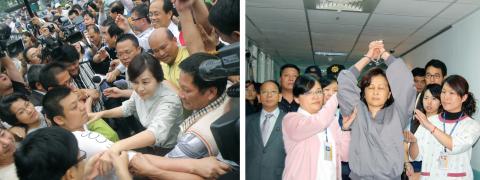A local court yesterday quashed charges of bribery against Yunlin County Commissioner Su Chih-fen (蘇治芬), who once led an 11-day hunger strike to protest against what she said was a political prosecution.
The verdict reached by the Yunlin District Court gave some relief to the embattled Democratic Progressive Party (DPP) commissioner who was overwhelmingly re-elected in 2009 -despite the -judicial proceedings.
Su had faced charges of accepting NT$5 million (US$174,845) in bribes to speed up approval of a landfill in the county by skipping an environmental assessment. Prosecutors had argued for a 15-year sentence and an eight-year suspension of civil rights.

Photo: Taipei Times
“There’s nothing happy about this ruling today. I have been innocent from the start in this case,” Su somberly told hundreds of supporters after the verdict was announced. “I have never accepted even one dollar in bribes.”
Suggesting that the decision relied on testimony from a key witness, Su said that she would like to thank a special person that “stood as firm as a mountain.”
“There are many things that I will not be able to disclose publicly, but I would like to especially thank a special friend,” Su said. “I especially express gratitude to you and am especially thankful for you.”
The ruling was keenly watched after Su and other DPP politicians said that prosecutors were on a “political witch hunt” to find misconduct connected to the Yunlin County commissioner.
Hundreds of supporters, including local politicians and community figures, gathered outside the courtroom, expressing support and proclaiming Su’s innocence before the ruling was announced in the afternoon.
Su immediately proclaimed her innocence when first detained in late 2008 and went on an 11-day hunger strike that saw her being rushed to the hospital, instead of paying a NT$6 million bail that she said she could not afford.
She has been called the poorest local commissioner nationwide, with financial disclosure records showing that she and her husband are more than NT$20 million in debt.
During her defense, lawyers acknowledged that the NT$5 million bribe was given, but said that the money was immediately returned by Lin Yuan-chuan (林源泉), Yunlin County’s deputy commissioner.
“We hope that Su is the last victim of Taiwan’s judicial system,” said Lee Ching-yung (李進勇), Su’s lawyer.
In a statement released after the verdict, the DPP called on prosecutors to thoroughly review the case, saying that the process was “flawed.”
DPP spokesman Cheng Wen-tsang (鄭文燦) said the controversy had irreversibly damaged Su’s reputation.
“Despite the not guilty ruling, the damage has been done,” Cheng said. “Despite a lack of evidence, [prosecutors] had brazenly searched and detained a local commissioner — creating divisions within Taiwanese society.”
Chiang Teh-lung (蔣得龍), spokesman for the Yunlin District Prosecutors’ Office, said prosecutors would decide later whether to appeal the case to the Taiwan High Court.
ADDITIONAL REPORTING BY RICH CHANG

FALSE DOCUMENTS? Actor William Liao said he was ‘voluntarily cooperating’ with police after a suspect was accused of helping to produce false medical certificates Police yesterday questioned at least six entertainers amid allegations of evasion of compulsory military service, with Lee Chuan (李銓), a member of boy band Choc7 (超克7), and actor Daniel Chen (陳大天) among those summoned. The New Taipei City District Prosecutors’ Office in January launched an investigation into a group that was allegedly helping men dodge compulsory military service using falsified medical documents. Actor Darren Wang (王大陸) has been accused of being one of the group’s clients. As the investigation expanded, investigators at New Taipei City’s Yonghe Precinct said that other entertainers commissioned the group to obtain false documents. The main suspect, a man surnamed

DEMOGRAPHICS: Robotics is the most promising answer to looming labor woes, the long-term care system and national contingency response, an official said Taiwan is to launch a five-year plan to boost the robotics industry in a bid to address labor shortages stemming from a declining and aging population, the Executive Yuan said yesterday. The government approved the initiative, dubbed the Smart Robotics Industry Promotion Plan, via executive order, senior officials told a post-Cabinet meeting news conference in Taipei. Taiwan’s population decline would strain the economy and the nation’s ability to care for vulnerable and elderly people, said Peter Hong (洪樂文), who heads the National Science and Technology Council’s (NSTC) Department of Engineering and Technologies. Projections show that the proportion of Taiwanese 65 or older would

Democracies must remain united in the face of a shifting geopolitical landscape, former president Tsai Ing-wen (蔡英文) told the Copenhagen Democracy Summit on Tuesday, while emphasizing the importance of Taiwan’s security to the world. “Taiwan’s security is essential to regional stability and to defending democratic values amid mounting authoritarianism,” Tsai said at the annual forum in the Danish capital. Noting a “new geopolitical landscape” in which global trade and security face “uncertainty and unpredictability,” Tsai said that democracies must remain united and be more committed to building up resilience together in the face of challenges. Resilience “allows us to absorb shocks, adapt under

Taiwan Semiconductor Manufacturing Co (TSMC, 台積電) yesterday said it is building nine new advanced wafer manufacturing and packaging factories this year, accelerating its expansion amid strong demand for high-performance computing (HPC) and artificial intelligence (AI) applications. The chipmaker built on average five factories per year from 2021 to last year and three from 2017 to 2020, TSMC vice president of advanced technology and mask engineering T.S. Chang (張宗生) said at the company’s annual technology symposium in Hsinchu City. “We are quickening our pace even faster in 2025. We plan to build nine new factories, including eight wafer fabrication plants and one advanced